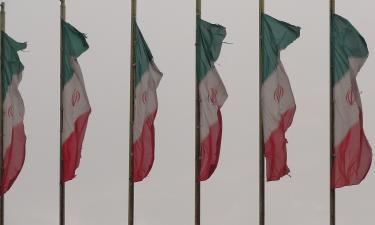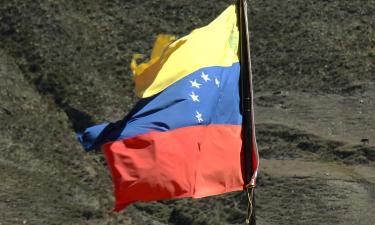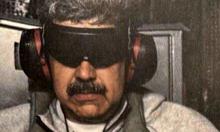Comment the war on air
The outcome of the war on Iraqi soil is still unknown, but America and Great Britain are losing the war on the airwaves.
There are two reasons for this. Twelve years ago, when coalition forces liberated Kuwait from Iraqi occupation, nobody doubted that justice had been done. The situation is exactly the opposite today. The war in Iraq was not sanctioned by the UN, was unleashed against the will of the majority of countries, and in spite of the millions of protestors worldwide. Consequently, many people, and the overwhelming majority in the Arab world, believe the attacks against Iraq to be illegal and unjustifiable. This is the first point.
Secondly, the whole world saw Operation Desert Storm through the television cameras of CNN correspondents on the roof of Baghdad's Al-Rashid hotel. Today, along with the dozens of film crews accompanying US and British forces, the Arab satellite channels Al-Jazeera, Abu Dhabi TV and Al-Arabia are working successfully in Iraq. Their reports allow viewers to see balanced information and compare points of view, while in the Arab world, there is the opportunity to see what is happening through Arab, and not western, eyes.
It should be acknowledged that the Iraqi media is working quite effectively, direct confirmation of which came in the form of yesterday's attempt by the coalition to knock out Baghdad television.
Against this background, the task of making the war in Iraq out to be one of liberation, rather than occupation, was far from easy. The US and British leaderships needed a quick success to convince the world and their own public opinions that they had acted correctly in starting an unprovoked war against a sovereign state and in breach of international law. They needed footage of Iraqis with joyous smiles meeting the liberating soldiers, anti-Saddam demonstrations, super-accurate bombs hitting their targets and, of course, no victims among the civilian population and their own ranks.
This is how it all started. Dressed in military uniforms, American and British correspondents in the first hours of the campaign began to file spirited reports about the successes on the fronts and how territories and towns had been taken under control. Television pictures showed barefoot Iraqi prisoners, with their scared faces and trembling hands bound behind their backs, while there were reports about popular uprisings and that the American forces were closing in on Baghdad. Saddam Hussein, if he were still alive, had apparently lost control over his army and country. CIA analysts examined his televised speech and came to the conclusion that it was a double, or at the very least, an old Saddam performance, i.e. it had been filmed well before it was claimed.
CNN and the BBC circulated images of burning oil wells in the south of Iraq and every day broadcast frightening warnings that the Iraqi dictator, trapped in a corner, would use chemical and biological weapons. Moreover, he would not only use them against American and British forces, but against his own people to show his ire and indignation with regard to the US and British forces who had come to liberate his people.
However, several days have passed and the picture has begun to change. The Iraqi Ministry of Information, without any technological innovations, and after losing time, has started to secure, in essence, a victory. "Despite the super-modern technology used by the allies in the information war," wrote the Ad-Dustur paper in Jordan, "the Iraqi side has shown itself to be more convincing and accurate, above all, because its statements and versions are confirmed by the facts." Firstly, the Iraqis proved without any particular effort that Saddam Hussein's national televised address after the start of the war was real, and not shot before hand. He referred to the time the military operations commenced, which he could hardly have done in advance. It is difficult to believe that George Bush himself warned him about when the first rocket strike would hit his Baghdad palace.
Secondly, it became clear that instead of roses in their hands, Iraqis had assault rifles and were in no way hurrying to surrender in whole divisions. Instead of this, crack troops in settlements in the God-forgotten depths of Iraq have been containing the world's most powerful weapons used by the Anglo-American forces for a week. An Iraqi commander who had been "taken prisoner" appeared on Iraqi television, while Al-Jazeera showed the world how an Iraqi soldier threw himself under an American tank and blew it up, losing his life in the process.
"American and English television," says Feisal Abu-Hussein, an engineer from Jordan, "does not tell the truth. I watch their programmes and compare them with Al-Jazeera reports. The former show American soldiers rejoicing as they launch cruise missiles, while the latter shows the peaceful Iraqis killed by these missiles and crying children. Judge for yourself what impression this makes." The longer the war goes on for, Abu-Hussein believes, the greater the death toll will be. Every missile that kills dozens of people on Baghdad's streets, every dead Iraqi child, will strengthen the anger and anti-American sentiments felt not only by Arabs, but also by every honest person, he says.
"The Iraqi realities did not turn out to be the same as the war planners had thought," says a major in the Jordan's army who identified himself as Avad. "The stiff resistance the Iraqis are putting up, which many people did not expect, means that they are not fighting for Saddam Hussein, but for their own land. The myth that the American and British forces had come to liberate Iraq, and bring freedom to the people, has been exposed as a bluff. Above all, they probably needed to think that it would be wrong to destroy the country to establish democracy in it." Avad also says that the war has essentially not even started. The battle for Baghdad lies ahead. The coalition forces will have to intensify their firepower to take it. This, he is confident, will lead to even greater destruction of the infrastructure and many more innocent victims.
Rakan Al-Majali, the director of the King Hussein Cultural Centre in Amman and long-time head of the Jordan Union of Journalists, believes that before the storm of Baghdad beings, Iraqi television must be knocked out of action, so that the Iraqi capital has no chance to communicate with the outside world. "Neither Washington, nor London, needs the world to see the price of liberating Baghdad. How successfully that is achieved greatly depends on the information component to this war," he says.
However, he is certain that no attempts to cover up the truth will be successful anyway. All the journalists in Baghdad would have to be rounded up and taken away to do this.
Washington and London so far remain on the losing side on this war's propaganda front.
Subscribe to Pravda.Ru Telegram channel, Facebook, RSS!





